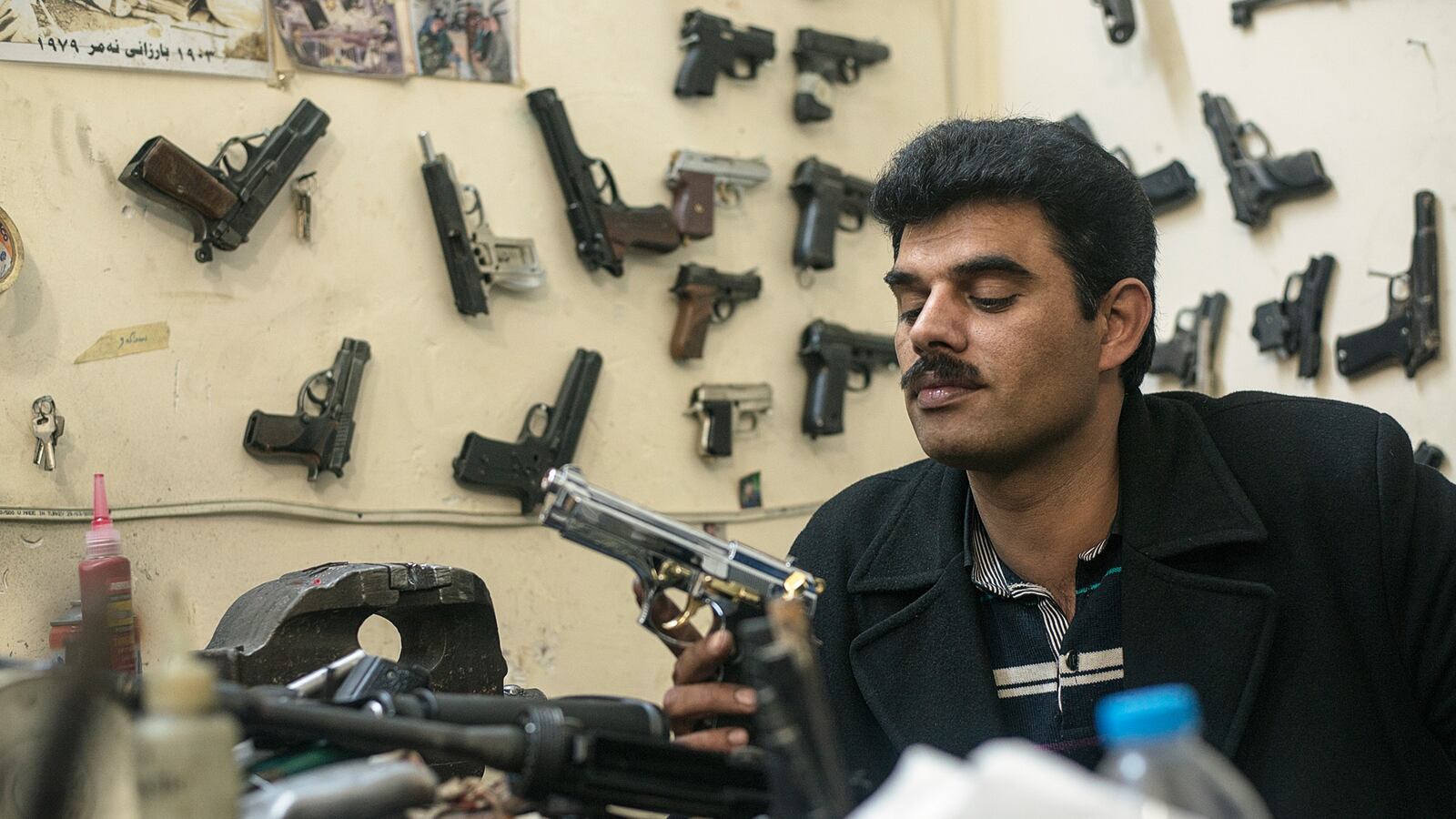While Iraq’s Kurdistan Regional Government presses the West for more and newer weapons to advance its war against the so-called Islamic State, one Kurdish craftsman is taking matters into his own hands.
Bakhtiar Sadradin Aziz’s weapons are cobbled together from bits and pieces of old rifles and pistols into Franken-guns that look like something out of Mad Max. But they have proved a hit for Peshmerga soldiers unsatisfied with their standard-issue Kalashnikovs and aging American surplus M16s. Many of the customers who venture into the 36-year-old gunsmith’s basement shop beneath Erbil’s 6,000-year-old citadel and bazaar are just looking for something more stylish. Others want better ammo, accuracy, and killing power.

“It’s my shop now, but this was my father’s shop, and my grandfather’s before that,” Bakhtiar says via a translator as he shoves an M16 barrel into a vise clamp. Before he can continue, the gunsmith is interrupted by a customer handing over a chrome-plated Beretta M9 with gold accents and engraved calligraphy. The pistol looks like it could be a weapon of choice for a Bond villain, but Bakhtiar nonchalantly throws it in his desk and says it’s just a repair job.
Some of Bakhtiar’s neighbors whisper that his clients include members of Iraqi Kurdistan’s Asayish secret police, but if that’s true, Bakhtiar isn’t saying. “Most of my clients are Peshmerga and government types, and people with permission from the government to carry guns,” he says. “I mostly just work here, but sometimes I go out into the field with the Peshmerga and fix their weapons there.”
Shortening the M16 barrel and swapping out its standard full-bodied butt stock to give the gun an M4 carbine’s aesthetic is one of Bakhtiar’s most popular services right now. Though it has less range, the real M4 is increasingly the standard-issue weapon of American ground forces, and the rifle has been popularized in movies and video games. However, as all American arms shipments to the Kurds must be distributed by Baghdad, the Vietnam- and Desert Storm-era M16s are the closest thing to a real M4 a young Peshmerga can get.
“The M16 is quite long, but we make it smaller to make it more efficient,” the mustachioed Bakhtiar says. “It’s a $2,500 rifle in Kurdistan, so they bring it in here and I charge $500 for it, or resell it for $3,000, whereas a normal M4 would sell for $9,000, so it’s a good deal for many people.”
Bakhtiar was never a Peshmerga himself, but today he unflinchingly supports them in their fight against ISIS, as he did previously in their conflicts against the Iraqi central government. He says he hopes the United States and other Western powers start supplying the Kurds with weapons directly, and he doesn’t fear the impact on his business new weapons might have.
“That won’t be a problem,” he says. “Those break down, too. I know how to fix them. I learned that from my father and my grandfather. I know how to fix everything.”
On the dusty, whitewashed walls of his tiny shop hang reminders that war, and the weapons behind it, are a generational affair for the Kurds. Rows of guns and gun parts—some straight from the box and others the shop’s own hybrids—fill every nook and cranny. The collection includes everything from modern Turkish shotguns and AKs to two World War I-era bolt-action rifles that Bakhtiar says were used to fight British colonial forces. Between those two rifles sits something even older: an aged wood-stock muzzle-loader designed to fire a musket ball.
“I don’t know who made it, but I think it’s at least 200 years old,” he says. “People come in a lot and ask to buy them, but those are from my grandfather, and they’re not for sale.”
Sadradin, Bakhtiar’s father, did weapons repairs for the Peshmerga, which made him a public enemy to the Baathists. He spent 14 years behind bars before being freed during the 2003 American invasion. When he returned home, Bakhtiar had grown up and was already running the gun shop, so Sadradin retired.
Despite this tragic family history—or perhaps because of it—Bakhtiar has begun training his 17-year-old son, Abdel Hakim, to take over the business. The oldest of five, Abdel Hakim handles customers and assists his father by passing him tools. A striking image of Bakhtiar sans mustache, the teenager says little but agrees with his father that one day the shop should be his.
“Yes, I want to do it,” he says. “My father did it and my grandfather did it, and I want to inherit this skill and take it even further.”
Though much of Bakhtiar’s focus is on combat weapons, many of his customers also come in to get repairs done on their hunting and air rifles. One such client is Peshmerga Capt. Amir Mohamed, 42, who says he knows Bakhtiar from the battlefield but for now is just coming in to pick up an air rifle for shooting small game.
Mohamed says he trusts Bakhtiar for repairs but doesn’t want one of his hybrids. “No way would I use them,” he says. “Some of the younger guys want them, and maybe they’d be good in a city, but they’re not good for long range, and I wouldn’t take them to the front.”
Mohamed says this while gesturing toward another of Bakhtiar’s creations: an AK-47 that’s been shaved down to pistol length and fitted to fire 7.62x25 pistol ammo instead of its normal 7.62x39 rifle cartridge. Bakhtiar laughs off Mohamed’s criticism and swears this new AK is totally safe; he says it should sell, too. “I make everything for money,” he insists. “You can’t make money in Iraq by just being creative, you have to sell everything.”
And at least for now, sales are good, with a steady stream of customers and window shoppers. Some stay for tea and cigarettes, while others just come and go. Many are fighters headed to the front to battle ISIS, and given Kurdistan’s history, it’s not hard to imagine today’s scenes playing out in the shop of Bakhtiar’s grandfather in decades past. Warriors always need weapons, and when they need something special, they come to Bakhtiar. The gunsmith acknowledges that conflict is crucial for his work but adds he longs for the day when he can sell only bird guns.
“The fighting does affect our business, but I don’t endorse any war,” Bakhtiar says, glancing at his son. “If I end up in a situation where there is peace, I have no problem with that.”






